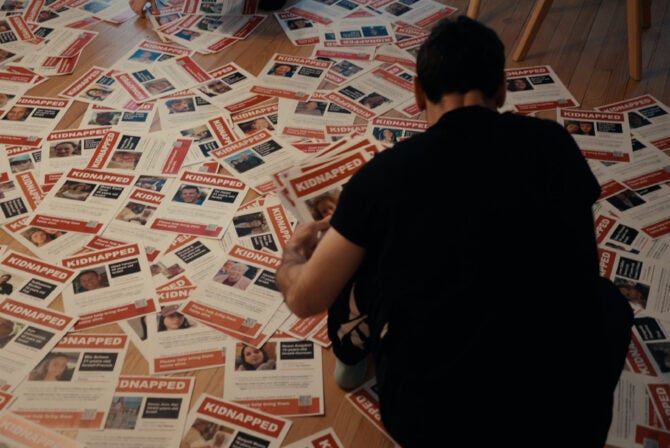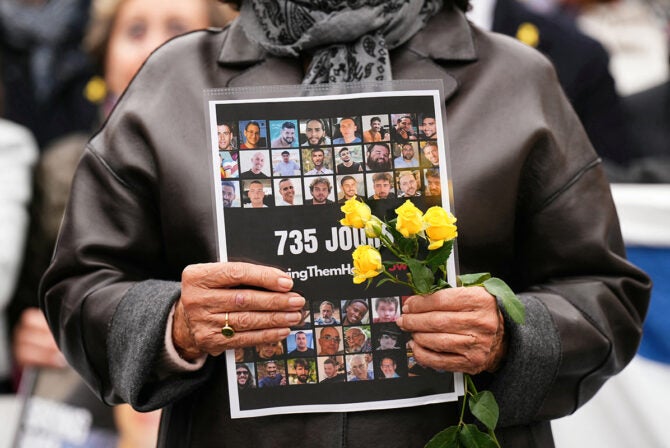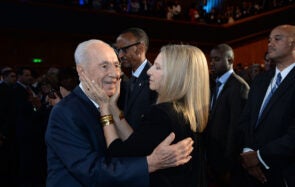All the living Israeli hostages are now, finally, home.
As thousands of Israelis sat to watch those healing first images from what has been for the last two years Tel Aviv’s Hostages Square, a song kept playing over and over: “HaBayta,” or “Home.” A cover of that song was recorded by 1,000 Israeli artists back in December 2023, after the first hostage deal fell through in November 2023.
“Home/Home/It is the time to return/From the mountains/From foreign fields/The day fades and there is no sign,” hundreds sang, along with the families of the hostages, while a full band played at the Caesarea Amphitheater. “Until the break of dawn/I pray for your wellbeing/Caught in the handcuffs of fears/I hear steps/Home, home/Because we still haven’t gotten/What was promised to us so long ago.”
“HaBayta” had been the song for the fight for the hostages since 2006, when it called for the return of Gilad Shalit and the late Ehud Goldwasser and Eldad Regev, whose captures led to the second Lebanon War. The words seem perfectly tailored to the despair and uncertainty and the desire for the hostages to return, and yet the song itself wasn’t written with the release of hostages in mind.
The story of “HaBayta” is indeed much older than battles for hostages. The inspiration behind it dates back to Yardena Arazi’s time singing songs to soldiers during the first Lebanon War in 1982. Being in the midst of all that danger and having her own close calls with mortality catalyzed the pop artist against the war. When she ran out of songs to sing, Arazi began singing “Shir LaShalom,” “A Song for Peace,” which she sang when she was in the army as part of the Nahal band.
She shared her despair at what she saw and experienced with celebrated songwriter Ehud Manor, who wrote many of the beloved singer’s — and her former group Shokolad, Menta, Mastik’s — songs. His song “Ein Li Eretz Acheret,” “I Have No Other Country,” was quoted on the senate floor in 2021 and was itself an anti-war protest song inspired by the loss of his brother during the first Lebanon War. Arazi’s experience inspired Manor to write “HaBayta;” they found the melody in the song “Manana, Tomorrow,” composed by Israeli composer Yair Klinger.
The song became a huge hit and helped launch Arazi’s solo career in her 30s, earning her the vaunted “singer of the year” title in 1984 — though the tune did also earn her death threats from pro-war activists.
There’s something so stately and so grand about this song, especially when accompanied by an orchestra, but even when sung without one. The words have such gravitas, especially the word home. It’s more than a song about four walls; it is a song about the very idea of home and homeland. Yes, the song itself calls for a withdrawal of troops from Lebanon and an end to the war, but the return to home in the song isn’t that of a physical place. The song calls for a return to home as in, a place of ideals, the ideals of a democratic country. Arazi says as much in the excellent episode of “One Song” which tells the story behind this song.
In 2003, Manor added new lyrics to the song that reflected his own feelings about where the country was 20 years after that war:
“The years pass, the years pick/And we still haven’t found solace/Generations come and go, the wet cheek/Cries a salty tear/As if calling/Home, home, the time has come to return/From the end of roads, from a brothers’ battle/To that same place in our heart/Home, home, the light still hasn’t gone out/To dreams without walls/To a night with no pain/Untill the rise of dawn I pray for your wellbeing/My country, keep, keep/The fragments of an Israeli dream,” he wrote.
Those final lyrics didn’t make it into the 2023 cover, but I can’t help thinking about how much the spirit of the song echoes the soul of the fight of the hostages. The marches, the protests, the pleas, felt sometime like a fight for the very spirit of Israel — for the good in it, the life-loving parts of it.
Seeing the hostages return really does feel like our home is being rebuilt.








